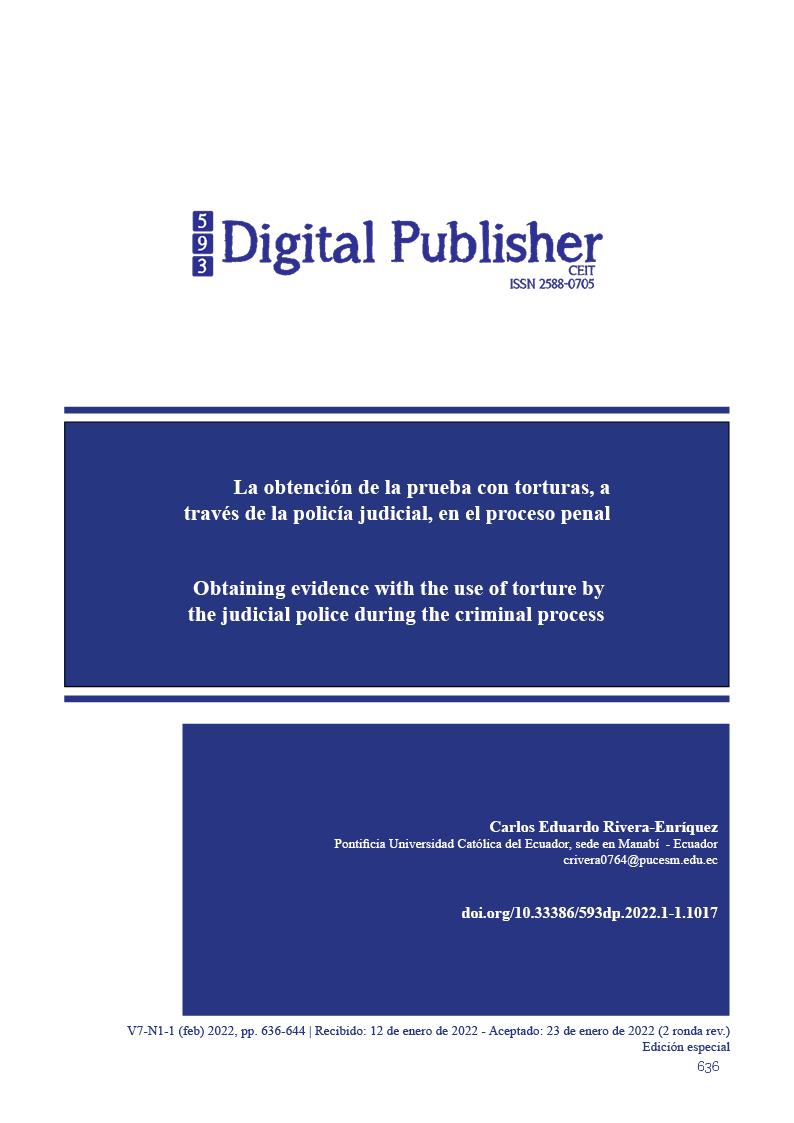La Obtaining evidence with the use of torture by the judicial police during the criminal process
Main Article Content
Abstract
This research work is framed within the criminal legal field, in which torture is described as a means of obtaining evidence through the judicial police; This acquired evidence contravenes legal provisions established in the Constitution of the Republic, criminal laws and international treaties that describe torture as inhuman, cruel or degrading treatment that when carried out will provide the immediate freedom of the victim, their comprehensive and specialized care; In the cases described, the application of torture is observed to acquire evidence of responsibility of the aggressor and apply a respective sanction, but, unfortunately, the police make use of these actions that violate the human rights of the people and they are found guilty of inhuman treatment. given to the aggressors and the aggressors who then continue to commit crimes are imprisoned and regaining their freedom, becoming a danger to society. In countries such as the United States, Mexico and others on the European continent, they have seen the need to apply torture to acquire information on the actions to be carried out by subversive groups, drug trafficking and terrorism, in this way they avoid large massacres of the towns where these are embedded. groups that have been threatening people, relatives, apply physical violence, kidnapping and therefore torture their victims. It is necessary to implement regulations and training for specialized personnel at the national and international level so that, in cases of crimes and disappearance of victims, kidnappings, torture is applied to acquire information and save lives.
Downloads
Article Details

This work is licensed under a Creative Commons Attribution-NonCommercial-ShareAlike 4.0 International License.
1. Derechos de autor
Las obras que se publican en 593 Digital Publisher CEIT están sujetas a los siguientes términos:
1.1. 593 Digital Publisher CEIT, conserva los derechos patrimoniales (copyright) de las obras publicadas, favorece y permite la reutilización de las mismas bajo la licencia Licencia Creative Commons 4.0 de Reconocimiento-NoComercial-CompartirIgual 4.0, por lo cual se pueden copiar, usar, difundir, transmitir y exponer públicamente, siempre que:
1.1.a. Se cite la autoría y fuente original de su publicación (revista, editorial, URL).
1.1.b. No se usen para fines comerciales u onerosos.
1.1.c. Se mencione la existencia y especificaciones de esta licencia de uso.
References
Folleto informativo Nro. 4 Los Derechos Humanos
Constitución de la República
Código Integral Penal
Caso Terranova Ecuador 2008
Mensaje de Trum https://ulisex.com/
Plan V Especiales Sobrevivientes 2008 Obtenido de https://sobrevivientes.planv.com.ec/miguel-alexander-cadena-polanco/: https//
Plan V Especiales Sobrevivientes 2008 Obtenido de https://sobrevivientes.planv.com.ec/miguel-alexander-cadena-polanco/: https//
Caso TERRANOVA
C.I.D.H.
Los policías actuaron sin orden judicial
Caso Gâfgen. Alemania
Declaración Universal de los Derechos Humanos
Convención Interamericana de los Derechos Humanos
Código Integral Penal Art. 152
Gordon, Rebeca. (2014). Maistreaming Torture, Oxford. Oxford.
Jimenez, M. (2014). La tortura como grave violación a los derechos Humanos y su imprescriptibilidad en la Legislación Ecuatoriana. Aportes Andinos. Obtenido de CUsers/Usuario/downloads/564-Texto%20del20art%C3%Adculo-2135-1-10-20181004.pdf: Fiel///
Luban, David. (2005). Liberalism and the Unpleasant Question of Torture. Virginia: Law Review.
Naciones Unidas, Derechos Humanso, oficina de alto rendimiento. (s.f.). www.ohchr.org/sp/professionalinterest/pages/cat.aspx. Obtenido de /www.ohchr.org/sp/professionalinterest/pages/cat.aspx: https://
PLAN v ESPECIALES SOBREVIVIENTES. (2009). sobrevivientes.planv.com.ec/yorgi-hernan-cedeno-saltos/. Obtenido de sobrevivientes.planv.com.ec/yorgi-hernan-cedeno-saltos/: https//
Rodriguez, Ramón. (s.f.). Derechos Humanos y justicia. Obtenido de www.juridicas.unam. mx/publica/librev/rev/derhum/cont/63/pr/pr22.pdf›.: http://
Ser inocente y estar preso, una realidad que se repite. (2009). biblioteca.defensoria.gob.ec/bitstream/37000/857/1/22-inocente.pdf. Obtenido de biblioteca.defensoria.gob.ec/bitstream/37000/857/1/22-inocente.pdf: https//


